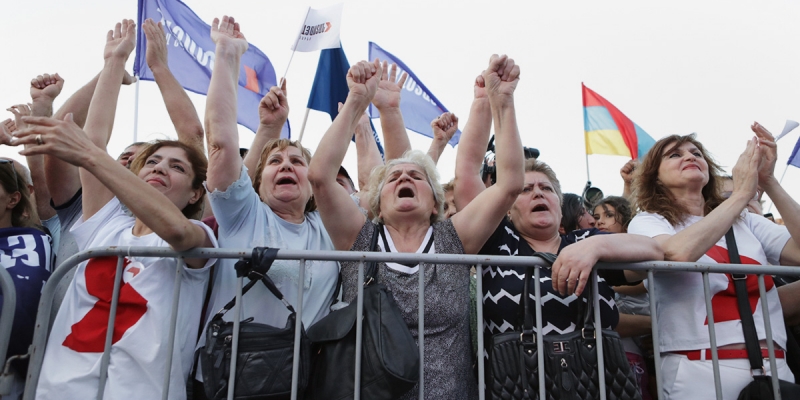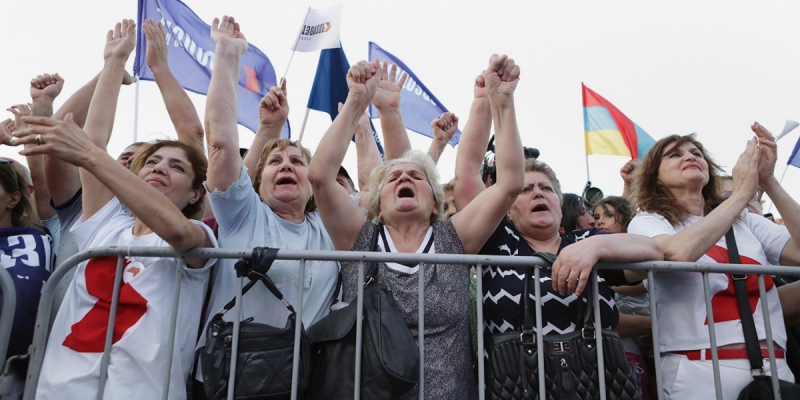In Armenia will hold early parliamentary elections, which will be a duel between Prime Minister Pashinyan and ex-President Kocharyan. Back in March, the former looked like an uncontested favorite, but by election day, the odds had leveled off

On Sunday, June 20, early parliamentary elections will be held in Armenia, which will determine who will become the country’s prime minister. The two main candidates are Acting Prime Minister Nikol Pashinyan and the second President of the republic Robert Kocharyan. The vote will actually be a duel between them-two irreconcilable opponents, the most prominent representatives of the revolutionary so-called old authorities. According to the latest opinion polls, their chances are almost equal.
The next prime Minister of Armenia will have to solve numerous economic and security issues – in 4.5 years, the mandate of the Russian peacekeepers in Nagorno-Karabakh will expire, and according to the trilateral agreement that stopped the war, they will be obliged to leave the region if one of the parties does not agree to the extension of the mission.
The odds are equal
In March of this year, when Pashinyan announced early elections, he was the uncontested favorite, whose victory looked inevitable. At that time, almost 32% of respondents were ready to vote for the prime minister’s block “My Step”, despite the defeat in the war, and for Robert Kocharyan and his block “Armenia”.;about 6%. Now the situation has changed radically-the ratings of the parties of Pashinyan and Kocharyan are equal. According to the latest poll conducted on June 5 & ndash;7 by the MPG sociological service (Gallup International’s partner in Armenia), 23.8% of respondents are ready to vote for the acting prime minister’s bloc, and 24.1% are ready to vote for the allies of the second president.
A total of 25 political forces will take part in the elections-21 parties and four blocs, all the presidents of independent Armenia since 1991 are running, including the first president Levon Ter-Petrosyan. In addition to the two main contenders, another force has a chance to overcome the threshold of the third president of the country, Serzh Sargsyan, “I have the honor” (7.4%).
An important feature of the upcoming elections in Armenia is the rule according to which the votes for the forces that did not overcome the barrier (for blocs-7%, for parties-5%) are proportionally distributed among the more successful candidates. The Constitution of Armenia also provides for a second round of voting if, after the distribution of votes, none of the parties, blocs or coalitions in the parliament has a majority of 54%.
The final result will depend heavily on the turnout, explains Armenian political analyst Alexander Iskandaryan. “Pashinyan’s electorate is mobilized. They will come to vote for him anyway. And many people who do not like Pashinyan are not going to go to the polls. Kocharyan’s task is to bring them to the polling stations, ” he told RBC.-If the turnout is minimal ,then [after recounting] 30% of Pashinyan can immediatelyturn to 40%. And if we take into account that 22 of the forces participating in the elections will not overcome the barrier, and if they collect at least half a percent, then this 40% can already turn into 50%. This is the reason for Pashinyan’s calculation. Serzh Sargsyan has left a brilliant Constitution for any ruling party. Under Sargsyan, in 2015, amendments to the Constitution were developed and adopted in a referendum, introducing a parliamentary form of government.
Due to the fact that almost all the forces going to the parliament are ready to form a coalition with Kocharyan, Pashinyan has much less chances to lead the government, Armenian political analyst Stepan Danielyan disagrees. He suggests that, in addition to the Sargsyan bloc, the “Prosperous Armenia” of billionaire Gagik Tsarukyan and the “Enlightened Armenia” led by Edmon Manukyan may also enter the parliament. And both of these parties tend to enter into a coalition with the second president.
Why Pashinyan is losing popularity
One of the main factors that influenced the change in the election ratings of the 46-year-old Pashinyan in the post-war period was the aggravation on the Armenian-Azerbaijani border in the Syunik and Gegharkunik regions. On May 12, the Azerbaijani military went there and since then they have refused to leave the territories that Armenia has occupied.it considers them to be its sovereign, and in this regard, the country even appealed to the CSTO. On May 25, an Armenian soldier was killed in a shootout there. And on May 27, Baku announced the capture of six Armenians who were mining the territory. Moreover, Nikol Pashinyan stated that the capture took place on the territory of Armenia, and not in the Azerbaijani rear.
Pashinyan’s rating is also affected by the inability to resolve the issue of prisoners of war, of which at least 150 remain in Azerbaijan. True, there have been changes in this direction over the past week-on June 12, 15 people were transferred to Armenia in exchange for maps of minefields at one of the sites in Karabakh (although Azerbaijan had previously denied having any prisoners). The popularity of the acting prime minister is not added by the aggressive statements of Baku andAnkara has announced its intention to receive the Zangezur corridor, which will connect Azerbaijan with Nakhichevan. The trilateral agreement that stopped the war in November last year does not imply the creation of a corridor as a kind of alienated strip, but only the unblocking of transport communications. Nevertheless, Azerbaijan’s mention of this wording allows Pashinyan’s opponents to accuse him of a possible betrayal of the country’s interests.
The second main reason for the decline in Pashinyan’s popularity is the collapse of state institutions, Alexander Iskandaryan notes. At the end of May, Armenian Foreign Minister Ara Ayvazyan and a number of high-ranking diplomats left their posts-only one acting deputy minister remained in the ministry. The head of the diplomatic department in the country changes for the second time in the past six months after the end of the war. His predecessor Zohrab Mnatsakanyan left because ofdisagreements with the prime Minister back in November. The Foreign Ministry remained the last institution that retained relative integrity and continuity after the defeat in the war, the interlocutors-diplomats in Yerevan told RBC earlier. Before that, in February, after the country’s General Staff, including its head Onik Gasparyan, called on Pashinyan to resign, almost the entire military elite of the country was replaced.
Video
Why Kocharyan is gaining popularity
66-year-old Robert Kocharian, on the contrary, is getting stronger and gaining significant allies in the last week before the elections. On June 18, he was supported by the former head of the General Staff of the country, Onik Gasparyan, who called on all military personnel to do the same. Prior to that, on June 14, former Prime Minister Karen Karapetyan joined Kocharyan. He was appointed to this position in 2016, and in May 2018, along with the third President SergeHe resigned as President of Armenia. Despite serving in the ousted president’s government,Karapetyan has maintained a reputation as a successful manager and technocrat. He was supposed to replace Sargsyan as president after the unrest began in 2018, but the authorities were late with the transit-as a result of mass protests, Sargasyan resigned as prime minister, the government was headed by Pashinyan.
Kocharyan enjoys the favor of Moscow & mdash; in April, just starting his campaign, he immediately recalled the presence of contacts with Russian President Vladimir Putin (their warm friendly relations were repeatedly mentioned by the Kremlin representative Dmitry Peskov). After that, he gave a dozen interviews to Russian media, mostly state-owned. In them, he emphasizes the lack of an alternative to Russia as Armenia’s main military ally,opposing himself to Nikol Pashinyan, who, in his opinion, is an anti-Russian candidate. “After the events of April 2018, the real relations with Russia somewhat outweighed, overshadowed and camouflaged the anti-Russian component of his sentiments, but now this is somehow beginning to manifest itself,” he said in a recent interview with RIA Novosti. Although Nikol Pashinyan at the rallies calls for deepening cooperation with Russia.
When asked why Moscow, Yerevan’s main ally, did not help stop the war earlier, Kocharyan replies that Russia did everything possible, but Pashinyan’s intractability is to blame. “It failed [to stop the war] for what reason? The Armenian side refused. <...> As far as I know, it could have been done (stop the hot phase.& mdash; RBC) literally in the first week of the outbreak of hostilities. Russia has made a proposal, and the Armenian side has consistently brought this process to a standstill. The Armenian authorities have brought the situation to war and put Russia in such an awkward position both as a mediator and, on the other hand, as a military and political ally, “he said in an interview with “Kommersant”.
“There is discontent in society [with Russia’s insufficient role]. The fact that it did not support the Armenians during the war in the way they wanted. But, on the other hand, it is clear that there is not much choice, and strategic cooperation with Russia today has no alternative. The Russian army, not the Armenian army, is now providing physical security for the residents of the Armenian partOf Nagorno-Karabakh, ” says Iskandaryan.Now it has simply become clear to the general public, and not just to experts, that the interests of Russia and Armenia do not coincide 100%. There are, of course, people who say that it is necessary to leave the CSTO and join NATO, to leave the EEU and join the EU. But these are not the forces that have any chance of entering parliament today.
What will happen after the election
The most important thing is not what will happen on June 20 on the day of voting, but what will happen on the next day and on June 22, Iskandaryan believes. He predicts that on the morning of June 21, both forces will declare their victory, given that they were going more or less smoothly before the vote on measurements, and will try to bring people to the streets. Kocharyan said that after the announcement of the results, street clashes may begin in Armenia. At the same time, he did not say at what result people will take to the streets,it will be his supporters or Nikola Pashinyan. But this will not happen if the CEC, the local election commissions conduct their work clearly, within the framework of the law, ” he added.
Stepan Danielyan believes that if Kocharyan wins, the supporters of the acting prime minister will be too demoralized for large-scale street actions. In this sense, he has less doubts about Kocharyan’s supporters-if there will be unrest, it will be in the case of Pashinyan’s re-election.

